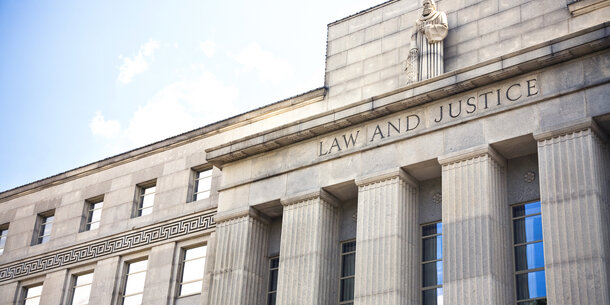The Biden administration’s first slate of judicial nominees is profoundly impressive in countless ways. Let me start to count them.
It’s impressive because of the layers of welcome diversity it will represent on the federal bench. Nine women out of the 11 initial candidates. People of color. Many on the early-ish sides of their careers. Four former public defenders in line for promotion of ascension to the bench. And on and on.
Quicker to the punch with 11 nominees before April 1 than Donald Trump or Barack Obama during either of their terms. And bolder than Obama, too, in terms of the progressive chops the nominees bring to the table and the clear, strong message they send to Republicans and the rest of the country.
It’s not just a message to the 81 million Americans who voted Biden into office after he promised he would look into shaking up the federal judiciary, including the Supreme Court. It’s also a message to those Republican-appointed federal judges who waited until Trump had left office before announcing their retirement or acceptance of “senior status,” which means that a successor can be appointed. Biden owes them the courtesy of replacements who are smartly chosen and swiftly confirmed. And it’s a message to everyone that the Democrats have learned at last from their counterparts how to make judicial nominations a core component of their political message. Slogan: Everyone wants the judges who rule their lives to at least try to look like their communities.
The diversity angle I want to highlight among the Biden nominees is diversity of profession. Four of Biden’s first choices are former public defenders. It is imperative that a judiciary that handles criminal cases — federal, state, or local — consist of more than former prosecutors or corporate attorneys given a reward for past partisan service. Judges who have experience as defenders are judges who have seen the justice system from a perspective no corporate attorney has seen. They have experienced it in ways prosecutors cannot imagine. And that ultimately brings a desperately needed diversity of thought to judging.
This is crucial when judging some of the federal drug cases that jam dockets around the country. Judging cases involving immigration enforcement and gun trafficking. Judging cases involving dubious plea deals forced by prosecutors or brutality against prisoners.
It’s important in civil cases, too, where prior experience as a defense lawyer might allow a judge to better understand the perspective of an employee versus an employer, or a tenant over a landlord, or a private citizen overwhelmed by the arbitrary exercise of government power. A public defender has to have the heart of an underdog. Underdogs are underrepresented on our federal courts today.
Two of the judges would be promoted if confirmed. The first is U.S. District Judge Ketanji Brown Jackson, who has been tapped to join the DC Circuit Court of Appeals. She served as a federal defender in the nation’s capital and is a top contender to be nominated one day to the Supreme Court by a Democratic president. That these two things can both be true — that a former public defender could again be on a shortlist for a Supreme Court vacancy — tells you how far Biden has pushed back here against his party’s recent history and four years of Trump nominees.
A second appeals court nominee, Candace Jackson-Akiwumi, now in private practice, is slated for the currently all-white Seventh Circuit Court of Appeals. From 2010 to 2020, Jackson-Akiwumi was a federal public defender in Chicago. The White House says she represented more than 400 indigent clients. Imagine the perspective she’ll bring to her bench as she evaluates evidence and weighs legal standards. Imagine how different it is likely to be from the panel she would join, which includes 10 or so former prosecutors and no former defense attorneys.
Another judge who would be promoted by Biden is Deborah Boardman, who is a federal magistrate judge in Maryland and has been tapped for promotion to district judge position. She also served for a decade or so as a federal public defender in Baltimore. Biden also will nominate Margaret Strickland out of private practice in New Mexico. She was a public defender for five years and must have been a good one, because she was president of the local defense bar there. The real-world experiences these women will add to their benches will be invaluable.
Last month, I asked here what was taking the White House so long to announce its first list of nominees. Now we know. In that same piece, I also challenged the Biden administration and Senate Democrats to embrace and achieve the goal of confirming 100 federal judges before the end of the year. That would mean another nine groups like this one, lined up one after the other, all filling existing federal judicial vacancies, all requiring Senate Judiciary Committee hearings in a chamber split 50–50. It would mean, as well, that the White House now already is working on the second batch and the third. Things worth doing are rarely easy.
There will be confirmation fights to come and some of those fights, given the state of the Republican party, are likely to devolve into debates over race and gender, part of the very diversity of which the Biden team ought to be most proud. The public defenders will be scorned for representing unpopular clients. They’ll be called inexperienced or too partisan. It’s all bunk. The manifestation of white supremacy here means dismissing qualified nominees of color after endorsing Trump’s less-qualified white nominees. The Senate Judiciary Committee will seek to confirm while GOP legislators in dozens of states seek to suppress the votes of people of color and while Senate Democrats work to get the votes they need on historic voting rights and election reform legislation.
Dahlia Lithwick at Slate put it a bit differently this week as she contemplated what the first Biden judges mean to the bench and society beyond it. “The real lesson the Biden judicial team may have learned, in replicating the actions of the conservative legal movement, is, ironically, that if your party has become toxic to the vast majority of Americans and American lawyers, even prestigious judicial brinksmanship affords you only the narrowest class of nominees,” she wrote. “But apply that same strategy to a party that is genuinely inclusive, respectful, and diverse, and the transformation in the legal movement can be ground-shifting.”
Like I said, if you believe the federal judiciary should and can better reflect the America it purports to serve, if you think that an appeals court full of prosecutors is going to consistently mete out equal justice to defendants in criminal cases, Biden’s first picks are both a very good start and a reminder of how far the journey to come will be.
The views expressed are the author’s own and not necessarily those of the Brennan Center.


